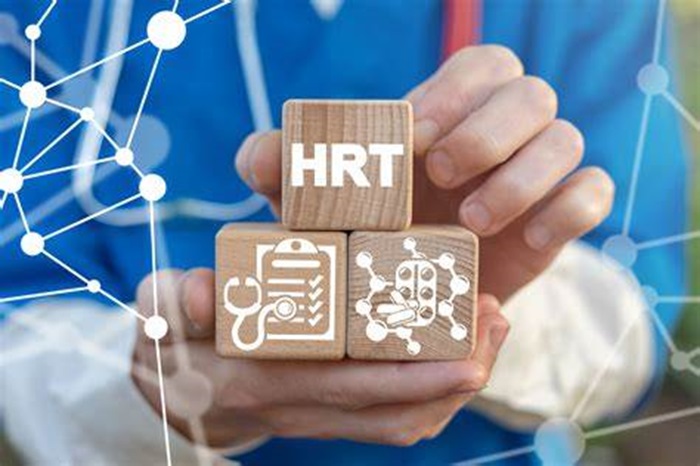Hormones play a crucial role in regulating metabolism. For example, hormones like thyroid hormones influence the rate at which the body burns calories. Insulin is involved in the regulation of blood sugar and also affects how the body stores and uses fat. In women, estrogen and progesterone have an impact on body fat distribution and metabolism. In men, testosterone levels can affect muscle mass and fat metabolism.
Changes in Hormones and Weight Gain
As people age, hormonal changes can occur. In women, the decline in estrogen during menopause is often associated with changes in body composition, including an increase in body fat and a decrease in muscle mass. This can lead to weight gain or a more difficult time maintaining a healthy weight. In men, a decrease in testosterone levels (andropause) can also result in a shift in body fat distribution and a possible reduction in metabolic rate, potentially contributing to weight gain.
HRT and Weight Loss in Women
Menopausal Weight Changes
During menopause, many women experience a redistribution of body fat, with more fat accumulating around the abdomen. This is not only a cosmetic concern but can also increase the risk of health problems such as heart disease and diabetes. The hormonal changes, particularly the drop in estrogen, can lead to a decrease in metabolic rate and changes in appetite regulation.
Effect of HRT on Weight
Some studies suggest that HRT may have a positive effect on weight in menopausal women. Estrogen replacement can help maintain or increase muscle mass, which in turn can boost metabolism. It may also reduce abdominal fat accumulation. However, the results are not consistent across all studies. Some women may not experience significant weight loss with HRT, and in some cases, there may even be a small weight gain, especially if the HRT regimen includes progesterone or if there is an increase in appetite as a side effect.
Mechanisms of Action
Estrogen can have several effects on the body that may influence weight. It can increase the activity of certain enzymes involved in fat metabolism. It may also have an impact on the production of hormones that regulate appetite and satiety. By improving the hormonal balance, HRT can potentially help the body function more optimally in terms of weight management.
HRT and Weight Loss in Men
Hormonal Imbalances in Men
Some men may experience a decline in testosterone levels as they age. This can lead to symptoms such as decreased energy, reduced muscle mass, and an increase in body fat, especially around the abdomen. Hormonal imbalances can also affect metabolism and make it harder to lose weight through traditional means.
Effect of Testosterone Replacement Therapy (TRT)
Testosterone replacement therapy (a form of HRT for men) has been studied for its potential effects on weight loss. In some cases, men who receive TRT may experience a reduction in body fat percentage and an increase in muscle mass. This can lead to an overall improvement in body composition and potentially a positive impact on weight. However, like in women, the results are not always straightforward. Some men may not see significant weight changes, and there can be potential side effects and risks associated with TRT that need to be carefully considered.
Mechanisms in Men
Testosterone can enhance muscle protein synthesis, leading to an increase in muscle mass. More muscle mass means a higher resting metabolic rate, as muscles burn more calories at rest compared to fat. Additionally, testosterone may have an effect on lipid metabolism, helping to reduce the accumulation of visceral fat.
Considerations and Limitations
Individual Variability
The response to HRT in terms of weight loss can vary greatly from person to person. Factors such as age, baseline hormone levels, overall health, lifestyle (including diet and exercise), and genetic factors all play a role. Some individuals may respond well and see significant improvements in weight and body composition, while others may not notice much of a difference.
Other Health Effects
While considering HRT for weight loss, it’s important to also take into account its other health effects. In women, HRT may have implications for breast cancer risk, cardiovascular health, and bone density. In men, TRT may affect prostate health and can have potential cardiovascular risks as well. These factors need to be carefully evaluated and discussed with a healthcare provider before starting HRT.
Lifestyle Factors
HRT should not be seen as a substitute for a healthy lifestyle. Diet and exercise are still crucial for weight management. Even if HRT has some beneficial effects on metabolism or body composition, a poor diet and lack of physical activity can counteract those benefits. Combining HRT with a balanced diet and regular exercise is likely to yield the best results in terms of overall health and weight management.
Duration and Dosage
The duration of HRT and the dosage used can also impact its effectiveness and potential side effects. Longer-term use may have different effects than short-term use. Additionally, the appropriate dosage needs to be determined based on individual needs and monitored regularly to ensure safety and effectiveness.
Conclusion
Taking HRT may have some potential benefits for weight loss in both men and women, particularly in the context of addressing hormonal imbalances that can contribute to weight gain or difficulty in weight management. However, it is not a guaranteed solution, and the results can vary significantly among individuals. Before considering HRT for weight loss purposes, it is essential to have a thorough discussion with a healthcare provider.
They can assess the individual’s hormonal status, overall health, and potential risks and benefits. Additionally, a comprehensive approach that includes a healthy diet and regular exercise should always be part of any weight management plan, even when considering HRT. By understanding the complex relationship between hormones, HRT, and weight, individuals can make more informed decisions about their health and well-being.
Related topics
- Will HRT Help With Weight Loss?
- What is the Best Time of Day to Take HRT for Women?
- A Comprehensive Overview of Estrogen HRT


